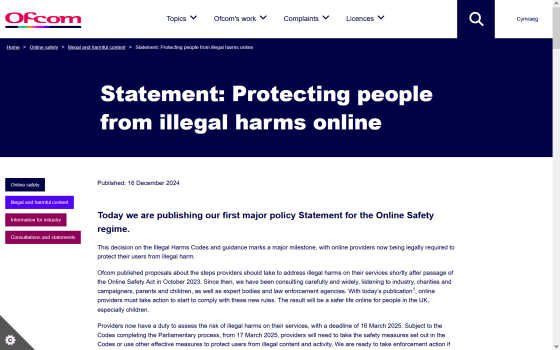UK Online Safety Law Comes into Force, Criticized for Effectively Shutting Small Site Operators Off the Internet

The UK passed the Online Safety Act, which requires internet service providers to assess the potential harm caused by their services by March 16, 2025. This bill has been criticized for placing too much of a burden on internet service providers, particularly small sites, by requiring excessive censorship and, in some cases, requiring them to set up age verification systems.
Statement: Protecting people from illegal harms online - Ofcom

Time for tech firms to act: UK online safety regulation comes into force - Ofcom
The UK Online Safety Bill: A Massive Threat to Online Privacy, Security, and Speech | Electronic Frontier Foundation
https://www.eff.org/pages/uk-online-safety-bill-massive-threat-online-privacy-security-and-speech
The Online Safety Act is described as 'imposing new safety obligations on social media companies, search engines, messaging, gaming apps, dating apps, pornography sites and file-sharing sites.'
The sites covered are wide-ranging, and on the assumption that the UK is one of the markets they operate in, most sites that allow users to show messages or images to other users will be regulated by the Online Safety Act. This applies not only to social networking sites, but also to online message boards.

The Online Safety Act, which was passed in October 2023, was reviewed by the UK communications regulator Ofcom, after which its contents were adjusted and it was officially published in the form of 'guidance' on December 16th of the following year.
This guidance imposes an obligation on 'providers' that operate websites and online services to assess the risk of harm that may be considered illegal on their services by March 16, 2025. Accordingly, from March 17, 2025, providers will be required to take safety measures set out in the terms and conditions or use effective means to protect users from illegal content and activities, and Ofcom may take enforcement action if providers do not act.
The Online Safety Act will impose far-reaching restrictions on providers, such as requiring them to monitor for illegal content, implement age verification, build backdoors into end-to-end encryption, and require legal authorization to add or change content.

The law has drawn criticism from many technology companies, who say it will impose burdens on providers.
For example, the online bulletin board 'Wikipedia' is subject to the Online Safety Act as an 'information sharing service' because users can edit and collaborate on content, and it must implement risk assessments and strengthen content moderation. The Wikimedia Foundation, which operates Wikipedia, said, 'This threatens volunteer-led content moderation and websites that contribute to the public interest, such as Wikipedia,' and expressed concern that the law would increase the burden on website operators.
The operator of LFGSS, a community site for cyclists that has been viewed by up to 500,000 people, said, 'This law is too broad. The law doesn't care that my site is run by an individual, that I run it for charitable purposes without pursuing any profit, and that this site exists to reduce people's loneliness, reduce suicide rates, and help build a meaningful society. I can't afford the huge costs required for a long legal process.' He revealed that after the deadline, he will effectively close about 300 small communities he operates, as well as large communities such as LFGSS.
The Electronic Frontier Foundation said: 'The Online Safety Act claims to make the UK the 'safest place in the world' online. In reality it will result in a more censored internet, potentially giving the government more power to undermine the privacy and security of internet users around the world, not just UK residents. Despite being under consideration for several years, the Online Safety Act remains vague about what it requires of both platforms and users, and has been derided as flawed by experts and businesses. The Online Safety Act would do the exact opposite of what it aims to do: make the UK the safest place in the world.'
Related Posts:
in Web Service, Posted by log1p_kr







